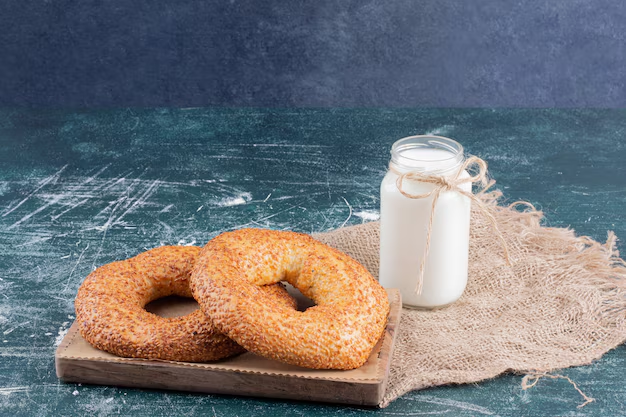The Ultimate Guide to Storing Bagels: How Long Do They Last in the Fridge?
Do you love bagels as much as most breakfast lovers do? That perfect balance between a crusty exterior and a chewy interior can feel like a delightful symphony to your taste buds. But what happens when you go overboard at the bakery and find yourself with too many? You might be tempted to store them in the refrigerator for later. But how long do bagels actually last in the fridge without losing their charm?
Discovering the Shelf Life of Bagels
Bagels, with their unique texture and taste, are best enjoyed fresh. However, understanding their shelf life helps ensure that they remain tasty and safe to consume. When it comes to refrigeration, bagels generally last about 5 to 7 days. However, much depends on how they are stored and the type of bagel.
Factors Affecting Bagel Shelf Life
- Ingredients: Most bagels are made from a combination of flour, water, yeast, and a bit of salt. Specialty bagels with dairy or fruits may spoil faster.
- Moisture Content: A higher moisture content can encourage mold growth, shortening their shelf life.
- Storage Environment: Temperature, humidity, and exposure to air all play critical roles.
Refrigerator vs. Countertop
The age-old debate—should bagels be stored in the refrigerator or left out on the counter? The answer largely depends on how soon you plan to consume them.
- Countertop Storage: If you're planning to eat your bagels within a couple of days, storing them on the countertop in an airtight container or a plastic bag is typically sufficient.
- Refrigerated Storage: For longer storage beyond a few days, refrigeration helps maintain freshness and slow spoilage, but may make bagels tougher and less fresh-tasting.
What About the Freezer?
For even longer storage, freezing is your best bet. Frozen bagels maintain quality for about 3 months. To freeze, slice bagels in half and place them in an airtight freezer bag to reduce freezer burn.
Tips for Storing Bagels
Storing bagels properly can mean the difference between a delightful breakfast and a disappointing one. Here are some practical tips to keep your bagels in peak condition:
- Use Airtight Packaging: Whether you're refrigerating or freezing, using airtight packaging is key to maintaining freshness.
- Avoid Storing with Other Foods: Bagels can absorb odors from surrounding foods, altering their flavor.
- Label and Date: Always label and date your storage bags to keep track of their freshness.
- Reheat Properly: Use a toaster or oven to reheat refrigerated or frozen bagels to restore a crispy crust.
Recognizing Spoiled Bagels
It's important to know when a bagel has gone past its prime. Here are some indicators that your bagels may no longer be safe to eat:
- Visible Mold: If you spot any mold, discard the entire bagel, as mold spores can penetrate deeper than what's visible.
- Stale or Hard Texture: While refrigeration can make bagels less soft, excessively hard bagels may be past their best days.
- Off Smell: An unusual odor is a clear sign that a bagel is no longer good to eat.
👈 Quick Tips Summary
- Fresh for: 1-2 days on the counter; 5-7 days in the fridge; up to 3 months in the freezer 🕒
- Protect Flavor: Use airtight bags and avoid storing with strong-smelling foods 🍞❌🧀
- Reheat: Toast or warm in the oven for the best texture 🔥
Storing Different Types of Bagels
Not all bagels are created equal, and some may require special care or have a slightly different storage life:
- Plain Bagels: The most durable, often lasting the longest.
- Cinnamon Raisin or Other Fruit Varieties: Due to the moisture content in fruits, these bagels may spoil faster when not stored properly.
- Everything Bagels: Ingredients like garlic or onion could alter the taste of other foods if stored together. Keep them separate.
Practical Consumer Tips
Understanding how to properly store bagels goes beyond simply wrapping them up. Here are some additional consumer tips for bagel enthusiasts:
- Buy Smart: Purchase only what you can consume within a few days if refrigeration isn’t an option.
- Portion Control: Freeze them in portions you typically consume to avoid thawing more than necessary.
- Creative Uses: Day-old bagels can be repurposed into bagel chips, croutons, or even bread pudding when freshness is no longer at its peak.
- Local Bakeries: Explore local options for fresh daily purchases to minimize storage needs.
Exploring Related Topics
Bagel storage might be just one of many kitchen storage conundrums you face. Learning more about general best practices can elevate your culinary skills:
- Bread Storage Techniques: Bread and bagels share similar storage requirements. Techniques learned here apply to both.
- Why Humidity Matters: Understanding how humidity impacts the freshness of baked goods can prevent early spoilage.
Bringing It All Together
Bagels are a versatile and beloved food staple, perfect for any time of the day. By understanding their shelf life and how to store them, you can savor their delightful taste longer. Whether you choose to refrigerate, freeze, or keep them at room temperature, remember that proper storage is key to maintaining their delectable texture and flavor. Keep these insights and tips in mind the next time you're delighted by the aroma of freshly baked bagels. Your breakfast routine—and perhaps a quick afternoon snack—will never be the same again!

